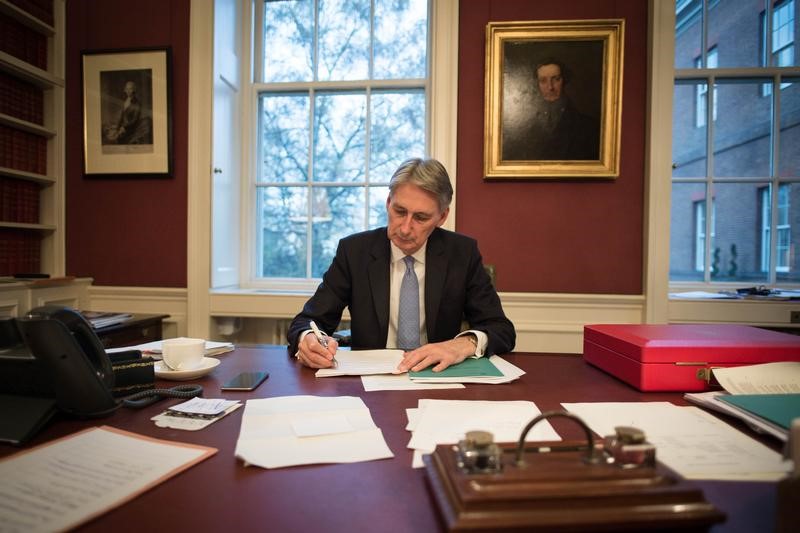By David Milliken and Andy Bruce
LONDON (Reuters) - British Chancellor Philip Hammond got some rare good news about the country's finances on Tuesday as he finalises his first budget statement, which is still likely to forecast a surge in borrowing as Britain prepares to leave the EU.
Breaking with a pattern of borrowing overshoots earlier in the financial year, official figures on Tuesday showed public borrowing in October was 25 percent less than a year earlier at 4.8 billion pounds ($6.0 billion), its lowest since 2008 and beating all economists' forecasts.
But Hammond still stands little chance of meeting the budget deficit reduction target for the current financial year which his predecessor, George Osborne, set out in March. He has already abandoned Osborne's goal of reaching a budget surplus by 2020.
Instead, economists predict Hammond could announce more than 100 billion pounds of extra borrowing on Wednesday, as Britain's independent budget office is likely to forecast slower growth, weaker tax revenues and higher social security costs in the wake of June's vote to leave the European Union.
"To put it bluntly, Brexit will be assumed to make the UK poorer which means the government must eventually lower spending, raise taxes, or permanently borrow more," Bank of America (NYSE:BAC) Merrill Lynch economist Robert Wood said.
Hammond played down expectations of much extra spending on public services or infrastructure to cushion the effect of years of uncertainty as Britain negotiates to leave the EU on Sunday, and described debt levels as "eye-wateringly" high.
Bank of America's Wood said he expected Hammond to announce extra discretionary stimulus that amounted to just 0.5 percent of gross domestic product, in part because he may want to keep his powder dry in case of a sharper economic slowdown.
This could include freezes to taxes on vehicle fuel and air travel, and modest further investment in infrastructure such as roads and broadband internet connections.
Britain's economy has slowed much less than most economists forecast since the Brexit referendum, and on Tuesday the Confederation of British Industry reported the fastest growth in factory orders since the June 23 vote.
But analysts see tougher times ahead for households as a 15 percent fall in the value of sterling against the dollar feeds into higher prices.
The public finances were underperforming even before the Brexit vote. Borrowing since the start of the tax year in April is 10 percent lower than in the same period of 2015 at 48.6 billion pounds, the Office for National Statistics said, versus a 27 percent fall needed to meet Osborne's 55 billion pound target for the whole tax year.
"The government is committed to fiscal discipline and will return the budget to balance over a sensible period of time, in a way that allows space to support the economy as needed," a finance ministry spokesman said after Tuesday's data.
Britain's budget deficit was 4 percent of GDP last year, down from 10 percent at the height of the financial crisis but still more than almost all other big economies.
The ONS said net public debt rose to a record 1.642 trillion pounds in October, equivalent to 83.8 percent of gross domestic product.

October's improvement in the public finances was driven by faster growth in tax revenues. Overall these were up 6.8 percent on the year, with particularly strong growth in corporation tax. The ONS was not able to say if the trend was likely to last.